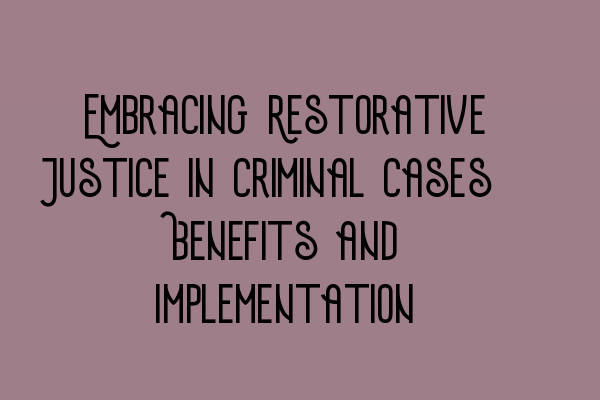Embracing Restorative Justice in Criminal Cases: Benefits and Implementation
In the realm of criminal law and practice, the concept of restorative justice is gaining increasing recognition as a valuable approach. Restorative justice focuses on healing the harm caused by crime and repairing the relationships between the offender, victim, and the community. This article explores the benefits of embracing restorative justice in criminal cases and provides insights into its implementation.
Benefits of Restorative Justice
Restorative justice offers numerous benefits to all parties involved in a criminal case:
- Victim Empowerment: Restorative justice provides victims with a platform to be heard, allowing them to express their feelings and needs. It empowers victims by involving them in the decision-making process and considering their perspectives.
- Offender Accountability: Through restorative justice practices, offenders are given the opportunity to take responsibility for their actions and make amends. This fosters a sense of accountability and can lead to reduced recidivism rates.
- Community Engagement: Restorative justice encourages the active participation of communities in the resolution of criminal cases, promoting a sense of belonging and social cohesion.
- Healing and Rehabilitation: By addressing the underlying causes of criminal behavior, restorative justice aims to facilitate the healing and rehabilitation of both victims and offenders.
- Cost-Effective: Restorative justice approaches have shown to be cost-effective when compared to traditional criminal justice processes.
Implementation of Restorative Justice
Successfully implementing restorative justice in criminal cases requires a comprehensive approach:
- Educating Stakeholders: It is essential to educate key stakeholders, including judges, lawyers, law enforcement personnel, and community members, about the principles and benefits of restorative justice.
- Legislative Support: Governments and legal systems need to enact legislation to support and promote the use of restorative justice approaches. This includes providing resources and training for practitioners.
- Collaborative Partnerships: Building partnerships between criminal justice agencies, community organizations, and other relevant stakeholders is crucial for the effective implementation of restorative justice programs.
- Training and Skills Development: Training programs should be developed to equip professionals with the necessary skills to facilitate restorative justice processes. This includes effective communication, conflict resolution, and empathy-building techniques.
- Evaluation and Improvement: Ongoing evaluation and research are essential to assess the effectiveness of restorative justice practices and identify areas for improvement.
At SQE Criminal Law & Practice Law UK, we recognize the value of restorative justice and its potential in transforming the criminal justice system. Our SQE 1 Preparation Courses and SQE 2 Preparation Courses are designed to equip aspiring solicitors with the knowledge and skills required to navigate the evolving legal landscape, including restorative justice practices.
Stay updated with the latest SRA SQE Exam Dates and enhance your preparation with our comprehensive resources, such as SQE 1 Practice Mocks FLK1 FLK2 and SQE 1 Practice Exam Questions.
Join us in embracing restorative justice and be part of the positive change in our criminal justice system. Together, we can create a more compassionate, inclusive, and effective approach to dealing with crime.
